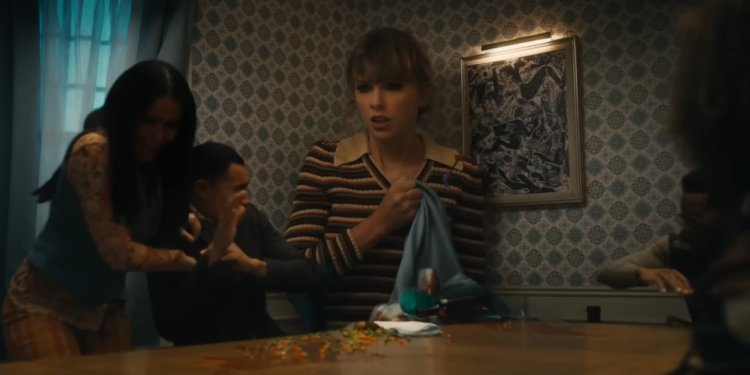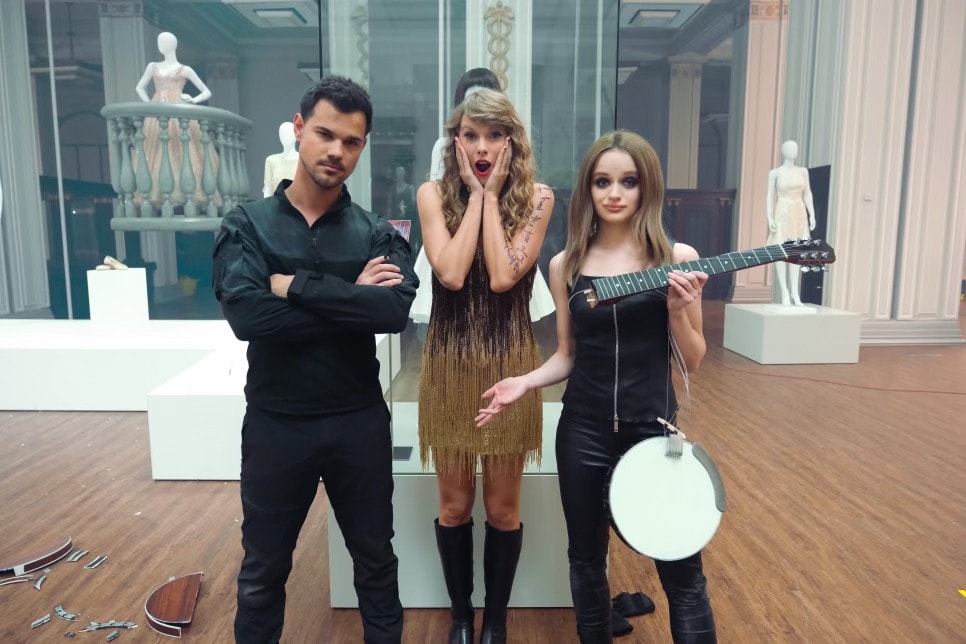Leading up to Taylor Swift’s latest album release, the American singer-songwriter’s fanbase provided a veritable labyrinth of rabbit holes for even the most casual observer to follow and lose themselves in.
Take the fact that the album was released on Kim Kardashian’s birthday, for example; “How is this relevant?”, you ask? “Oh, are they friends?”, you ask. No, not quite, au contraire: Taylor Swift has a long-standing feud with Kim and her (now ex) husband Kanye (now Ye). It began in 2009, with Ye storming the stage at the Video Music Awards, while a then-20-year-old Taylor Swift was accepting an award, all to express his appreciation for Beyonce.
Kanye later referenced this event in his song “Famous,” showing some real class by taking credit for Taylor Swift’s fame, poetically:
“I feel like me and Taylor might still have sex
Why? I made that bitch famous.”
Taylor Swift announced this album at the 2022 VMAs, exactly 13 years after Kanye snatched her microphone. It has also been noted by the many arbiters of Taylor Swift literature (Swifterature), that the dress Ms Swift wore during the announcement was reminiscent of the dress she wore to the awards show in 2009.
This is just one of many theories that led to this album, which had a tracklist announced with a daily bulletin from Swift on TikTok.
@taylorswift Tonight we mayhem til the morning! AND release vinyls with pics I signed in them on my site! Gonna be a wild ride 😜 #TSmidnighTS #SwiftTok #MidnightsMayhemWithMe
To call all this marketing masterful would be reductive and insulting. It built suspense, with provocative song titles and smirks to the camera that gave us Swifties frustration so intense, it would make Sisyphus blush.
This would’ve been enough to make fully grown adults wake up at ridiculous o’clock in the morning, and it was.
Spotify reported outages in over half its coverage area. Is Taylor Swift content to just deliver? Obviously not! Three hours after “Midnights” released, she released a completely unexpected further seven songs, saying on Instagram:
“Surprise! I think of ‘Midnights’ as a complete concept album, with those 13 songs forming a full picture of the intensities of that mystifying, mad hour. However! There were other songs we wrote on our journey to find that magic 13.”
The intensely autobiographical nature of her album and her songwriting process has been something Swift has been adept at marketing since her early country career, being one of the first artists to use social media with a public MySpace.
The famed Secret Sessions, pre-release listening sessions, for her “1989” album had invite lists curated from the people who engaged with her most on Tumblr. Taylor swift invented and innovated extensively in the art of shaping, understanding and marketing to Stan Twitter culture, and I feel like there’s a lot of trivialisation of this expertise in the media.
On, now, to the album itself.
These 13 songs are full of memorable moments and referential in the first, second and third person. It references midnights across her lifetime and to break down every reference here would fill a book or three. A lot must be left open to interpretation, but here is a thematic journey through a first listening of the album.
The opener, “Lavender Haze” is sonically striking, befitting an album that is bookending weeks and months of speculation and apprehension. The tone and soundworld for this album are established and explored, with an indie electronic vibe that plays well into the arcs of the main creators of this album: Taylor Swift and Jack Antonoff. The intertextuality of Taylor Swift’s lyrics is, as it has been for three albums, an increasingly nostalgic and subtle set of literary references.
“Lavender Haze,” for example, is a 1950s term that describes the state of being in love.
“Maroon” follows, reminiscent of the spirit and sound of her “1989” album. Catchy refrains and hooks over deeply evocative synthesiser soundscapes show a musical evolution brought forward from sister albums “folklore” and “evermore.”
“Anti-Hero,” vividly describes anxiety, insecurity and intrusive thought cycles, with vulnerability and eloquence possible only of Taylor Swift. This song is clearly of consequence, having been put in music video form hot on the heels of the album release.
The music video is a very personal showing of the anxiety that looms over many millennials and Gen-Z, who form a large proportion of Swift’s audience. The relatability ripples across the social media response.
me listening anti hero #MidnightsTaylorSwift pic.twitter.com/3FfcJKI8q1
— giaaaaa (taylor's version) (@gingerpendeja13) October 21, 2022
The Lana Del Rey collaboration, “Snow on the Beach” shows entirely why Taylor Swift is the monolith she is: Del Rey is an absent contributor, in a way that makes you forget she’s featured here at all.
“You’re on your Own, Kid” is another vulnerable reflection and anthem of self-sufficiency, with a refrain reminding Swift and all willing to listen that all we have is ourselves, the resolute strength emanating from her softened voice and a gentler but determined beat thumping through to bring closure and hope from start to finish.
Here follows a duo of songs that exhibit another kind of midnight experience. It feels like the moments leading up to last orders at a bar, as she conversationally, nostalgically, but not sadly, tells you about her past.
“Midnight Rain” is a story about the one who got away, the right person at the wrong time. Someone who wanted a family, while she wanted to beat the path forward for her career. He has a family now, she says, “it came like a postcard.” She has no resentment and can live with her choice, however poignant the memory of love is.
“Question…?” Doesn’t only border on the conversational, it poses a direct question like a friend would over drink, placing you in her partner’s shoes; it’s about kissing in crowded rooms, and paints a picture of Swift’s early days in New York in an overwhelmingly social romance that was too much for her.
“Vigilante Shit” follows in the steps of folklore’s “no body, no crime”, with Swift donning the femme fatale mistress role once again, speaking of affairs and fiercely asserting independence.
Related Articles: From Singer to Director: Taylor Swift Talks ‘All Too Well’ | What Music Means in Times of War
“Bejewelled” is a boppy reclamation of her ability to “make the whole place shimmer”, conveying that she is no longer a prop and looks good for only herself. It is yet another expression of the toll that being a woman in the public eye has taken, and she’s done shining to please.
“Labyrinth” is a concise and atmospheric interlude of anxiety, this time about falling too fast and how it’s burned her in the past, but again, she’s a labyrinth and can’t find her way back out.
“Karma” is her hit song “Shake it Off,” but more intended for, and directed at the haters, reassured that she’s “kept [her] side of the street clean”, and knows that “Karma’s a comforting thought, but for [the haters] it’s not”
“Sweet Nothings” is a little lullaby of love for her partner, Joe Alwyn, speaking of the comfort of simple domesticity that he provides, a safety blanket from the harsh public eye. The song is co-written with Alwyn, under his pseudonym William Bowery, and it’s so intimate and soft that it feels voyeuristic, almost, to be listening; like eavesdropping on pillow talk.

Taylor explores the lower parts of her register quite a bit in this album, which hits the ear richer and stronger than it ever has, from the 32-year-old singer. It exemplifies the maturity that echoes throughout and, new to real adulthood, many of us Gen-Z swifties are vindicated and encouraged to grow with her.
Bookending the 13 songs released as the barebones version of the album is the deliciously subversive “Mastermind.” While reclaiming the agency from the narrative of free-falling love, she gladly embodies the calculating woman that the entertainment media shows any woman with a voice to be. She’s happy, grown and growing still, and needs no validation to be her own person, her own artiste.
This album is a groovy modern nostalgia soundscape, keeping up with the modern trend of 80s-inspired pop in a way that only the doyenne of literary pop writing could do. Jack Antonoff sweetens, embellishes and substantiates the album with a brilliantly warm, edgy and lush world of electronic drum patterns and synthesisers that should be begging for Grammy nominations in production.
It’s dark and pretty and worth driving through tunnels in the wee hours of the morning too. It’s an album about midnights, for midnights, that has one particular writer currently moist-eyed and hugging a heart-shaped plushie.
I’ve been a swiftie since I was an age expressed by a single digit. Do I find myself overwhelmed by the sound and feel of this album? Not particularly. Does that mean that this album isn’t excellent?
God, No! Taylor Swift is evolving faster than the speed of thought, and the arc from “reputation” and “1989” to this album is one of relentless education and regeneration of personality, musicality and a journey of self-discovery. Now so self-assured, the album is a memory foam pillow to lie on, just to catch the radiation of self-confidence that doesn’t need to shout to be firm and respected.
This is hard-fought, harder won, and the next album and every single one thereafter is going to show a life lived by one Taylor Swift, unhindered by hate, misogyny or all the other garbage Scooter Braun made the mistake of embodying.
Editor’s Note: The opinions expressed here by the authors are their own, not those of Impakter.com — In the Featured Photo: Taylor Swift’s album “Midnights” logo. Featured Photo Credit: Taylor Swift on Wikimedia commons.














